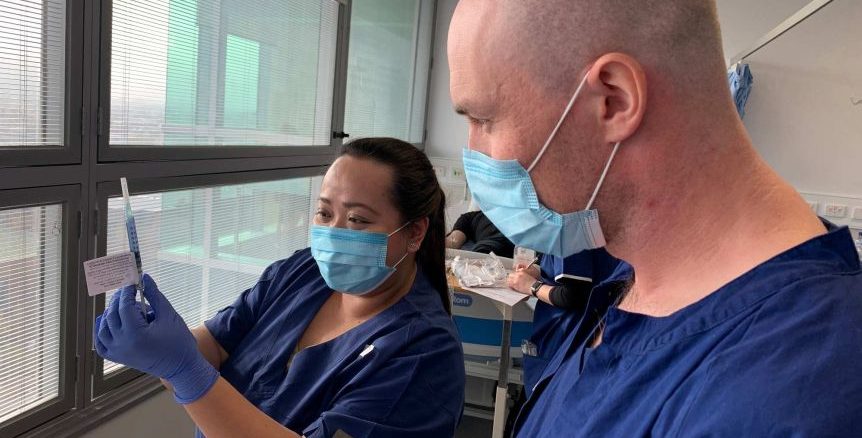
WEDNESDAY NOV 11
A Sydney bar has been slapped with a $10,000 fine after dancing and hugging patrons sparked multiple COVID safety breaches, news.com reports.
Odyssey Bar Restaurant in Leichhardt was hit with the coronavirus fine after NSW Department of Customer Service inspectors viewed CCTV footage of large groups mingling and dancing in multiple locations across the venue.
The footage, seized by Liquor & Gaming NSW, shows dozens of patrons mingling, dancing and hugging across several areas late into the night and early morning on October 17 and 18.
Liquor & Gaming director of compliance Dimitri Argeres said there was a complete disregard for social distancing that resulted in two $5000 fines being issued to the venue.
“It’s hard to fathom how staff could have failed to notice and stop things getting out of hand as patrons had in effect created multiple dancefloors,” he said.
“The COVID Safe requirements are in place for a reason, and all venues need to make sure they are fully compliant.”
It comes as Department of Customer Service inspectors are getting ready for a second COVID safety blitz on Wednesday night, with pubs and clubs screening the second State of Origin rugby league match set to be checked for compliance.
A team of 30 inspectors detected almost 100 coronavirus breaches during a previous blitz at local hospitality businesses in Sydney’s southwest last Friday.
A total of 94 breaches were found at 32 hospitality venues in Liverpool during a one-day blitz on Friday that resulted in more than 25 penalty notices and thousands of dollars in fines.
Mr Argeres said of the 74 hospitality venues inspected, 13 were not registered as COVID Safe, 39 did not have a current safety plan, 20 had issues with record keeping, seven were not properly adhering to social distancing, two displayed hygiene issues and 13 had no COVID-19 safety marshal.
###
A day after Donald Trump fired defence secretary Mark Esper, three people staunchly loyal to the US President have been appointed to top defence jobs.
Among them is a former Fox News commentator who failed to get through Senate confirmation because of offensive remarks he made, including about Islam.
The abrupt changes sent reverberations through the Pentagon as nervous civilian and military staff waited for the next shoe to drop.
The appointments have also fuelled concerns there is a wider effort to remove anyone considered not loyal enough to Mr Trump.
While radical policy shifts seem unlikely before president-elect Joe Biden’s inauguration on January 20, the changes could further damage prospects for a smooth transition already hampered by Mr Trump’s refusal to concede his election loss.
There have also reportedly been concerns about what the Trump administration may do in the months before Mr Biden takes office and whether there will be a greater effort to politicise the historically apolitical military.
James Anderson, who had been acting undersecretary for policy, resigned on Tuesday morning local time.
He was quickly replaced by Anthony Tata, a retired Army general and former Fox News commentator.
A short time later, Joseph Kernan, a retired Navy vice-admiral, stepped down as undersecretary for intelligence, hastening an exit he had already planned.
He was replaced by Ezra Cohen-Watnick.
The departures came on Christopher Miller’s second day as defence chief.
Mr Miller also brought in his own chief of staff, Kash Patel, to replace Jen Stewart, who had worked in the role for Mr Esper.
###
Sophisticated “eskies” packed with dry ice and GPS-enabled thermal sensors will be used to transport one of the most promising COVID-19 vaccine candidates in Antarctic temperatures, if it’s approved by Australian regulators, according to the ABC.
The Pfizer and BioNTech candidate is one of four potential vaccines the Australian Government has secured, and it will import about 10 million doses from overseas manufacturers if it’s successful.
The coronavirus invades cells through so-called “spike” proteins. The Pfizer vaccine contains genetic material called mRNA, which basically comes with molecular instructions to assemble the spike protein, so the body can produce antibodies and learn to fight the virus.
But it needs to be stored at ultra-cold temperatures of -70 degrees Celsius, posing additional logistical challenges for authorities.
The head of the Therapeutic Goods Administration (TGA), John Skerritt, said the doses would be placed in temperature-controlled thermal shippers, which would use dry ice to maintain Antarctic temperatures.
“Pfizer have done some really clever work on what are, I guess Australians would call them eskies, they’re very sophisticated eskies that require dry ice.
“They last 14 days and can be refilled twice.”
The shippers will be decked out with GPS-enabled thermal sensors, with a control tower that will track both the location and temperature of each vaccine shipment.
While protein-based technology forms the basis for flu vaccines, mRNA technology has never been successfully manufactured and distributed before anywhere in the world.
The Federal Government has opted to buy doses of the vaccine from overseas in the event it’s successful, rather than produce it in Australia.
That means the vaccine would need to be transported significant distances.
Most airlines limit the amount of dry ice allowed to be carried on board, however Professor Skerritt said he did not anticipate that would be a problem.
“As someone who formerly shipped vaccines and antibodies by dry ice around the world in a previous job, there are limitations — you can only carry so much dry ice,” he said.
“As of November 23, instead of one or two flights a day between Sydney and Melbourne, we’ll be back to having dozens. [The] opening of domestic borders will help distribution here.”
SheSociety is a site for the women of Australia to share our stories, our experiences, shared learnings and opportunities to connect.

Leave a Reply